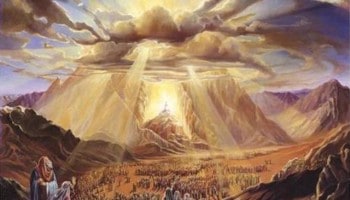How did Jesus get off the ground according to the Talmudic tradition (there is some debate as to whether this was the Jesus, but the simple reading is that it is)? The Talmud states that the issue was that the Rabbi didn’t communicate properly to Jesus. When Jesus erred (he accused his Rabbi of having improper thoughts), he was too harsh in his rebuke and didn’t bake into the rebuke a hint of love that if Jesus were to repent, he’d be welcomed back with open arms. The Talmud is quite critical of the Rabbi who created the rift with Jesus as it led to Jesus beginning an idolatrous cult of some type that was antithetical to Jewish thought. Interestingly, this week’s parsha gives an illustration of the correct type of communication needed that would have averted this whole crisis.
Correct
communication needs to be multifaceted. It has to speak at several levels at
once. It needs to have an element that shows strength and an appeal to justice;
yet, it also needs to contain love and understanding. It also needs to appeal to the intellect and
to be polished. We know this from this week’s confrontation between Yehuda and
Yosef. It doesn’t say in the Torah that Yehuda came to speak to the viceroy (he
didn’t know at the time that it was Yosef), but that Yehuda approached the
viceroy. What does an approach entail?
The midrash
says that the word approach is used in the context of war, appeasement, and
prayer. A just war occurs when one side
feels an injustice has been done. An appeasement speaks to the heart of a
person and looks to find the loving side of that person. Finally, prayer is about realizing that every
complicated situation requires divine assistance to get the balance right
between these two dimensions. In other words, part of what made Yehuda’s speech
successful was that it was multifaceted. He didn’t only threaten and he didn’t
only beg, he did both. More than that, the structure of the speech was
considered to be beautiful and well-spoken, hinting that leaders also need to
express themselves with rhetorical skill.
In short,
two of the most important encounters in human history depended on how well the
communication occurred. When done
correctly, it led to the ultimate reconciliation between the brothers. When
done poorly, it led to a young student feeling spurned by his teacher and
choosing to go his own way with catastrophic consequences for the Jewish people
over the course of history.


 As we start the Torah over again, it is important to look at
old stories with fresh eyes as new discoveries are always lurking. This year, I
took an in-depth look at the first quarrel of mankind between two
brothers. Although we find relationships
between groups to be complex, those overt differences are not necessary. There
is plenty to fight about within the family, which is sadly all too common as well. The first criminal act between two people occurs
between two brothers- Kayin and Hevel.
It is a short story but telling to what is the source for much conflict.
As we start the Torah over again, it is important to look at
old stories with fresh eyes as new discoveries are always lurking. This year, I
took an in-depth look at the first quarrel of mankind between two
brothers. Although we find relationships
between groups to be complex, those overt differences are not necessary. There
is plenty to fight about within the family, which is sadly all too common as well. The first criminal act between two people occurs
between two brothers- Kayin and Hevel.
It is a short story but telling to what is the source for much conflict.











